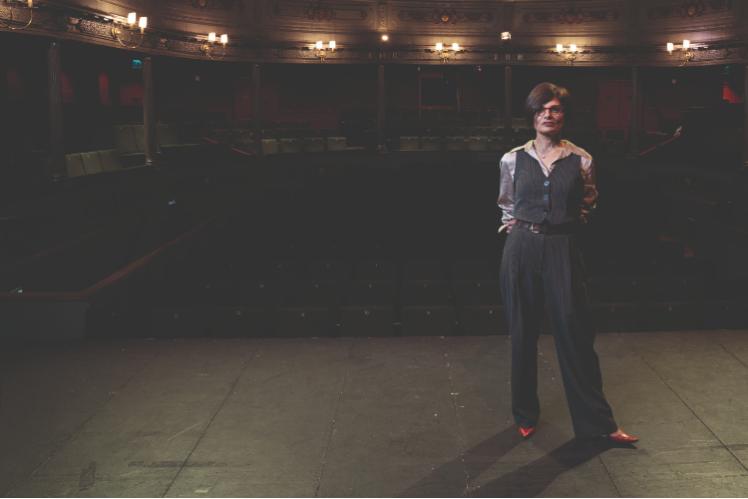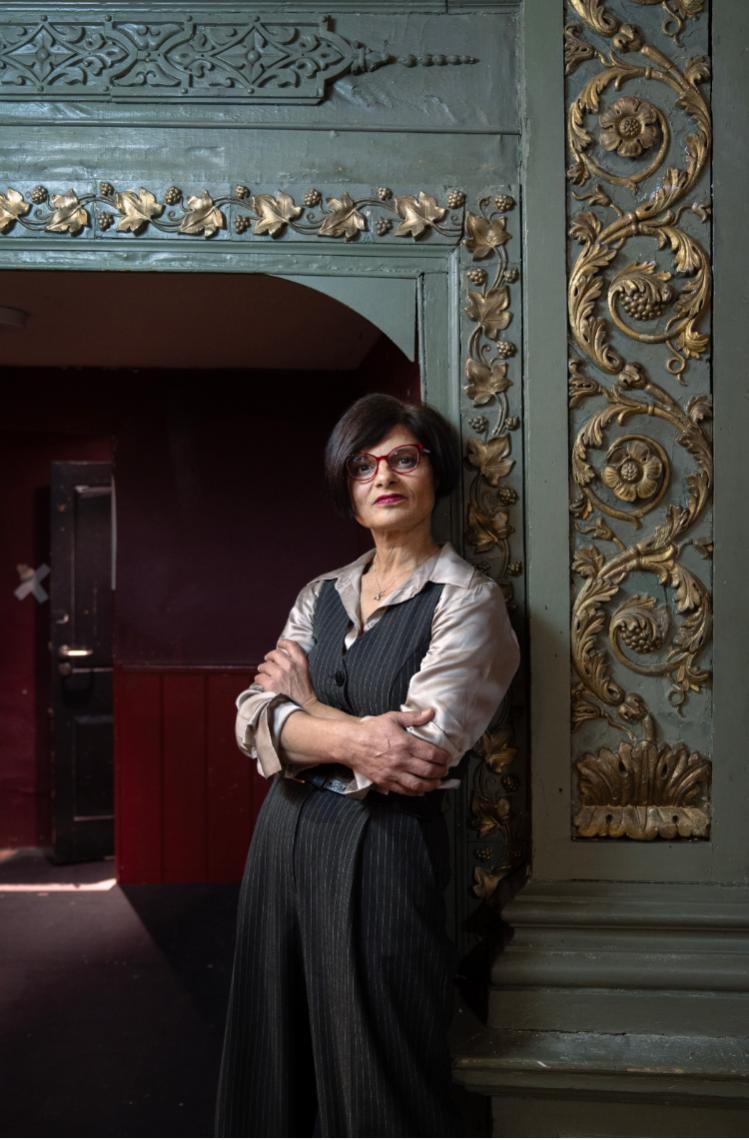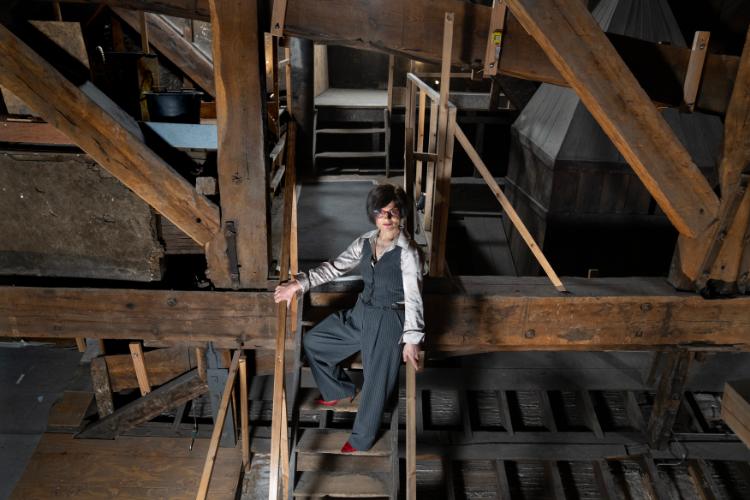Thangam Debbonaire: "I will never take voters for granted"
10 min read
Shadow culture secretary Thangam Debbonaire speaks to Sophie Church about Labour’s plans for the creative industries, and why she is confident of seeing off the Greens. Photography by Tom Pilston
Thangam Debbonaire is in fighting spirit. “Did you have any more on my seat other than that?”
We are sat in Bristol Old Vic, Britain’s oldest working theatre, and a location chosen by the shadow culture secretary for the interview that is in the new Bristol Central constituency.
It’s coming to the end of our time together, but Debbonaire wants to keep sparring on whether she’s in danger of losing to the Greens – as Electoral Calculus currently forecasts – at the election.
What would she say to voters who feel betrayed by Labour’s backpedalling on certain pledges, such as its climate commitments?
Debbonaire denies Labour has U-turned on the climate, and insists, quite heatedly, that Labour has not watered down its aims “in any way, shape or form”.
Is she concerned that Labour’s explanations are simply not cutting through with voters, and we are seeing that reflected in the polls?
“I will never take voters for granted,” she says. “The polls I’ve seen recently, I’ve been predicted to win by quite a lot. However, I do not take polls as the indicator of future success. I take what I’m getting on the doorstep as an indicator of how voters actually feel,” she says. “And I’m sure you’ve talked to voters in my patch, but you can’t possibly have talked to as many as I do.”
It will be really unhelpful for the BBC if I started laying out different funding options at this point
“People I talked to up and down Bristol West, and Bristol Central as it will be at the next general election, tell me they’re sick of the Tory government, they want a change and they know perfectly well: the only way they’re going to get a change of government is by having a Labour government and that you only get a Labour government by keeping Labour MPs and adding more. You don’t get a Labour government by removing one.”
Debbonaire, 57, has deep roots in the Labour Party. Both her grandparents were very politically active: her grandfather a Cowley Works car factory employee, later becoming a Labour councillor; her grandmother constantly discussing politics, but never given the chance to run for office herself.
“He was a good councillor. But again, I’ve always thought my grandmother would have made an even better one,” she says with a smile.
Her parents, both musicians, ignited Debbonaire’s lifelong passion for music. Her father came to England on a one-way ticket from India, where he met her mother at the Royal Academy of Music. Debbonaire has been playing cello since the age of four.
 Thangam Debbonaire (Photography: Tom Pilston)
Thangam Debbonaire (Photography: Tom Pilston)
She is now one quarter of Parliament’s string quartet, the Statutory Instruments, with journalist and fellow Statutory Instrument Cathy Newman inventing the name, Debbonaire says.
“Always trust the writer to come up with a clever thing! It was during the Brexit years, we were rehearsing, and one night she forgot her music stand. And I improvised one out of a load of box files that had different statutory instruments in them,” she says. “We’d been looking for the name of the band, as you do, and she said, ‘that’s what we should be called’.”
When Debbonaire received the call from Keir Starmer last year that she was to be his culture secretary, she did a little dance for joy. But though Debbonaire is experienced in the arts, her constant refrain is that the Labour Party “has work to do”.
Debbonaire recently set out her vision for her brief: focusing on supporting a pipeline of talent into creative industries. Now, she reveals that Labour will create legislation to protect freelancers from late payments.
“Being a musician, being a filmmaker, being a writer, waiting three, four months to be paid means you can’t pay your bills,” she says. “We are going to legislate for late payments; we think it’s just not okay. It’s often very big organisations across all sorts of sectors who will just sit on freelancers’ bills, because they know they can. Freelancers aren’t going to be able to afford to take them to court or have means to do that, so having really clear laws is really helpful.”
Chair of the Music All-Party Parliamentary Group Kevin Brennan recently said legislation was needed on artificial intelligence (AI) to “help stave off the threats it poses” to the music industry.
“Copyright law exists to incentivise human creativity by rewarding humans for the use of their IP,” Brennan wrote on PoliticsHome. “AI companies cannot simply purloin that property and repackage it for their own gain without permission or a licence from its owners.”
Debbonaire says copyright law already protects creators; what’s missing now is a way of recognising and recompensing creators in the new world of digital, tech, AI and streaming. While she says she needs “to look in more detail at what legislation might be needed”, she hints that “there are ways that that can be done” that “won’t all require legislation”.
We have to make sure that, no matter what, we do protect our free press
“For AI, that body of work is also developing, and it’s also a cross-team effort. So with Pete Kyle, who’s our shadow secretary of state for DSIT [the Department for Science Innovation and Technology], we’ll need something that we can both see is going to work,” she says.
While introducing an AI Bill could be a tough sell at home, Debbonaire is enthusiastic about co-operating with other countries on AI copyright practises.
“Spain has already passed legislation on equitable remuneration and streaming. The European Union has passed European-wide legislation on AI, which has got impacts for the creative industries. If we’re going to have improved trade relations with Europe – and we will, we are determined to – we’ll need to look at how that ties into practices in the two separate jurisdictions,” she says. “I hope that the European Union will be receptive to that. I understand anecdotally that they will be.”
While Labour thinks the government has been “backward” on AI – Debbonaire calls the lack of inclusion of a creative industries strand in the government’s Bletchley Park AI Summit a “real failure” – both Labour and the Conservatives are in agreement that the freedom of the media landscape must be protected.
 Thangam Debbonaire (Photography: Tom Pilston)
Thangam Debbonaire (Photography: Tom Pilston)
Can Debbonaire confirm Labour will not seek to revive the second stage of the Leveson inquiry?
“Yes,” she responds. “We have to make sure that, no matter what, we do protect our free press. When I say ‘no matter what’, I don’t mean: they’re not allowed to break the law, they’re not allowed to harass people – that’s already a criminal offence. So there are plenty of things that are covered by criminal law.”
Has Labour got any plans to hold the media to account?
“There is already media regulation, there is already the criminal and civil law. We don’t have plans to do anything, any new legislation in that area, no,” she says.
Debbonaire’s reverence for the BBC is well-documented. True to form, she says today that “if we didn’t have the BBC, you’d want to invent it”. However, she plays down recent murmurings about Labour making the license fee free for those living on benefits.
I’m sure you’ve talked to voters in my patch, but you can’t possibly have talked to as many as I do
“That’s not something I’m looking at, at the moment,” she says. “It will be really unhelpful for the BBC if I started laying out different funding options at this point. I think it’s really important that we recognise the BBC has to be funded. It has to be funded in a consistent way that they can rely on. We’ll also have charter renewal under the next Labour government if we win the next general election. There’s a lot of work to do there. But that’s not something I’m looking at, at the moment, no.”
Debbonaire’s approach to her brief can be characterised by this hands-off attitude. “I’ve got no business telling the BBC how to run its news, any more than I’ve got any business telling an arts organisation [like a] museum what they should hang on their walls – something which the Tories seem to ignore all the time,” she says.
However, politicians having their own shows on platforms like GB News and LBC makes her feel uneasy. “It’s quite a challenge for me to see how we resolve having politicians of a particular party with entire programmes on a station that’s called news, when we have news regulation that is quite strict about impartiality and political impartiality and balance,” she says, later revealing she has “already met with Ofcom” to discuss whether it has the tools it needs to decide whether politicians have acted with impartiality.
But when her Labour colleagues host their own shows – David Lammy on LBC, for instance – Debbonaire’s response is less critical.
“I mean, I think what David’s done with the show is use it as a means of communicating,” she says. “Ofcom will have to regulate any and all news outlets for how they put that content together and whether or not it complies with impartiality.”
When Debbonaire took on her brief, she made headlines for admitting she had never been to a football match. But today she sets the record straight.
“My nephews did remind me that I’d been to see them play when they were kids. But I think that’s partly –” she says, pausing. “There’s often an interesting question for politicians about how much you say about your family… and, yeah.”
Debbonaire seems to draw back at this mention of her family. Why?
“One of the things that definitely happened to me as a default setting when I came into politics was that I do not talk about my family unless I absolutely have to, because it’s their lives, not mine,” she explains.
“But I’ve had lots of conversations throughout the nine years of what things they would quite like me to talk about, and what things they think it’d be useful for me to mention or are okay with me mentioning if it’s appropriate, and that’s definitely one of them.”
Debbonaire also seems reluctant to discuss her drinking choices – she prefers to drink in moderation now after a cancer diagnosis nine years ago – saying she mentioned alcohol in an interview “a long time ago”.
 Thangam Debbonaire (Photography: Tom Pilston)
Thangam Debbonaire (Photography: Tom Pilston)
But in relation to changing the rules to allow football fans to drink alcohol in the stands, she says: “At the very least, I owe it to football clubs to look at whether or not there is scope for changing that rule.”
As the interview draws to a close, we move back to home ground: music. It was a mixture of Bach, Beethoven and techno that carried Debbonaire over the 2024 London Marathon finish line. Has she got any techno recommendations?
“Oh, no, no, no, no, I’m not going there,” she says. “Because when you name favourites that’s when you miss someone out. It’s a complicated thing. No, I’m going to duck out of that one.”
However, she says: “there’s not really any day that I don’t listen to either a bit of a [Bach] Cello Suite or a bit of a Violin Partita.”
For now, Debbonaire is working towards playing her final Suite of Bach’s Cello Suites – her “life’s pursuit”. Just that, and the small matter of campaigning for a general election.
“I think my grandmother’s looking down on me from her cloud and is very proud. That’s what my mum says. My family are really proud that I’m a Labour MP,” she says. “Now, they want to see a Labour government.”
